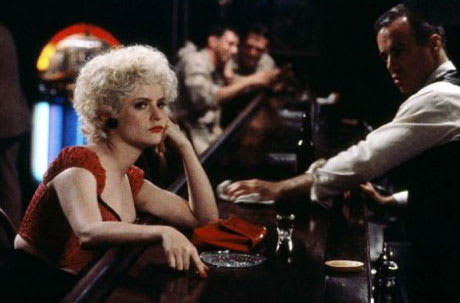Part morality play and part defeatist ode to the redundancy of personal betterment in a world that genuinely doesn't give a shit, Uli Edel's adaptation of cult Hubert Selby Jr. novel Last Exit to Brooklyn still holds up as a deeply magnetic, epic descent into hell on earth some 20 years after release. There's insularity to it, taking place in low class '50s Brooklyn, melding the angst of post-war apathy and beatnik nihilism, which serves as an inescapable vacuum for its gallery of downtrodden characters. Said characters are connected via the various stories of Selby's segmented novel, pivoting upon prostitute Tralala (Jennifer Jason Leigh), who works with a gang of hoodlums to proposition sailors and steal their money. She crosses paths with transvestite Georgie (Alexis Arquette), whose gay, Benzedrine-driven parties attract the attention of married, closeted, low level union leader Harry Black (Stephen Lang) during a protracted labour strike. Frequently dwelling on the dilapidated location shot environment, lingering on images of characters walking into the shadows on empty, leave strewn streets, with long decayed buildings and signs, there's an unnerving sense of hopelessness that permeates even while Tralala strives to find a man that will take care of her and Harry follows his heart. It rings loudest during the extended strike breaker sequence, where hundreds of strikers are beaten by police and attacked with fire hoses, treated like interchangeable, disposable nuisances by a faceless oppressor. While bleak and easily dismissed as cynical by deluded optimists, there's an undeniable hidden American truth to this lyrical and strangely engrossing story of defeat, regardless of the possible moralistic interpretation, wherein queers and whores get what they "deserve" (gang rapes and death). Included with the DVD is an old school 40-minute "Making of," which has that "First Choice" vibe of prosaic dialogue and lofty ambition. When not using purple prose to describe Brooklyn, they discuss the horrors of shooting on location and the difficulty of getting such a controversial film funded and made. It's actually quite engaging, even if it's laughably dated. Unfortunately, this can't be said for the commentary track with the very German Uli Edel.
(eOne)Last Exit to Brooklyn
Uli Edel

BY Robert BellPublished Oct 12, 2011



